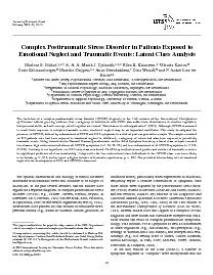Complex Posttraumatic Stress Disorder in Patients Exposed to Emotional Neglect and Traumatic Events : Latent Class Analysis
The inclusion of a complex posttraumatic stress disorder (CPTSD) diagnosis in the 11th revision of the International Classification of Diseases reflects growing evidence that a subgroup of individuals with PTSD also suffer from disturbances in emotion regulation, interpersonal skills, and self-concept, which together are termed “disturbances in self-organization” (DSO). Although CPTSD is assumed to result from exposure to complex traumatic events, emotional neglect may be an important contributor. This study investigated the presence of CPTSD, defined by endorsement of PTSD and DSO symptoms in a clinical postwar generation sample. The sample consisted of 218 patients who had been exposed to emotional neglect in childhood, a subgroup of whom had also been exposed to potentially traumatic events. Using items from the Harvard Trauma Questionnaire and the Brief Symptom Inventory, a latent class analysis revealed two classes: high endorsement of almost all CPTSD symptoms (n = 83; 38.1%) and low endorsement of all CPTSD symptoms (n = 135; 61.9%). Contrary to our hypothesis, no DSO-only class was found. The R3step method showed gender and number of traumatic events to be significant predictors of class membership. Compared to the low endorsement class, individuals in the CPTSD class were more likely to be female, p = .013, and to report a higher number of traumatic experiences, p < .001. The potential intermediary role of emotional neglect in the development of DSO and CPTSD is discussed.
Dit artikel beschrijft een onderzoek met ROM data onder de naoorlogse generatie. De te beantwoorden vraag was: is emotionele verwaarlozing zoals die vaak plaatsvindt onder de NOG, volgoende voor het ontwikkelen van problemen met zelfbeeld, relaties en emotieregulatie zoals je dat ziet bij complexe PTSS, of heb je daar toch traumatische ervaringen en PTSS voor nodig? Het antwoord was: nee, bij NOG is emotionele verwaarlozing alleen niet genoeg voor het ontwikkelen van die problemen. Deze problemen komen voornamelijk voor in combinatie met PTSS, en worden voorspeld door vrouwelijke gender en het meemaken van een groter aantal traumatische ervaringen.
Geachte bezoeker,
De informatie die u nu opvraagt, kan door psychotraumanet niet aan u worden getoond. Dit kan verschillende redenen hebben,
waarvan (bescherming van het) auteursrecht de meeste voorkomende is. Wanneer het mogelijk is om u door te verwijzen naar de bron
van deze informatie, dan ziet u hier onder een link naar die plek.
Als er geen link staat, kunt u contact opnemen met de bibliotheek,
die u verder op weg kan helpen.
Met vriendelijke groet,
Het psychotraumanet-team.
In: Journal of Traumatic Stress, ISSN 0894-9867 | 32 | 1 | February | 23-31
https://onlinelibrary.wiley.com/doi/epdf/10.1002/jts.22363


